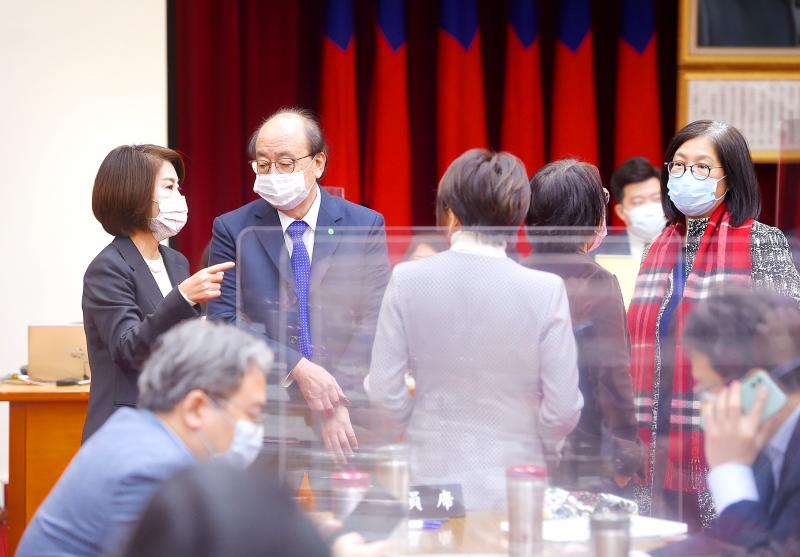The opening session of the Constitutional Amendment Committee at the legislature in Taipei got off to a rocky start yesterday, with Chinese Nationalist Party (KMT) lawmakers storming out soon after it began.
Democratic Progressive Party (DPP) lawmakers gathered for the inaugural session at 9am while their KMT counterparts arrived shortly afterward, followed by Taiwan People’s Party representatives.
KMT members said that they objected to DPP Legislator Chou Chun-mi (周春米) being chosen as convener before they entered.

Photo: Fang Pin-chao, Taipei Times
They accused the DPP of breaching legislative regulations governing committee meetings.
DPP Legislator Chung Chia-pin (鍾佳濱) said that proceedings had conformed to the regulations and members had reached quorum, so he and DPP Legislator Kuan Bi-ling (管碧玲) raised the motion to nominate Chou, which was approved by those who were present.
KMT Legislator Jessica Chen (陳玉珍) said her party members were only one minute late.
KMT members then exited the meeting in protest, saying that it was a DPP ploy to breach the regulations, derailing the process of constitutional amendments.
“We had quorum and complied with regulations to nominate a convener,” Chung said. “Were the KMT in charge, we would abide by the procedures, allowing it to nominate a convener.”
“As members of the ruling party, we respectfully listen to suggestions and opinions of opposition members, so I ask that the KMT members return and do the work at this committee,” he said.
Later yesterday, the KMT at a news conference accused the DPP of not wanting the meeting to get started, so it orchestrated a way to halt proceedings while blaming the KMT.
The caucuses on Sept. 14, 2020, agreed to set up the committee amid calls to amend the Constitution, including a proposal to lower the voting age from 20 to 18.
The 39 members of the committee were named after seats were allotted to parties based on their proportion of seats in the legislature.
Additional reporting by Chen yun and CNA

The Grand Hotel Taipei on Saturday confirmed that its information system had been illegally accessed and expressed its deepest apologies for the concern it has caused its customers, adding that the issue is being investigated by the Ministry of Justice Investigation Bureau. The hotel said that on Tuesday last week, it had discovered an external illegal intrusion into its information system. An initial digital forensic investigation confirmed that parts of the system had been accessed, it said, adding that the possibility that some customer data were stolen and leaked could not be ruled out. The actual scope and content of the affected data

‘LIKE-MINDED PARTNER’: Tako van Popta said it would be inappropriate to delay signing the deal with Taiwan because of China, adding he would promote the issue Canadian senators have stressed Taiwan’s importance for international trade and expressed enthusiasm for ensuring the Taiwan-Canada trade cooperation framework agreement is implemented this year. Representative to Canada Harry Tseng (曾厚仁) in an interview with the Central News Agency (CNA) said he was increasingly uneasy about Ottawa’s delays in signing the agreement, especially as Ottawa has warmed toward Beijing. There are “no negotiations left. Not only [is it] initialed, we have three versions of the text ready: English, French and Mandarin,” Tseng said. “That tells you how close we are to the final signature.” Tseng said that he hoped Canadian Prime Minister Mark Carney

POSITIVE DEVELOPMENT: Japan and the US are expected to hold in-depth discussions on Taiwan-related issues during the meeting next month, Japanese sources said The holding of a Japan-US leaders’ meeting ahead of US President Donald Trump’s visit to China is positive news for Taiwan, former Japan-Taiwan Exchange Association representative Hiroyasu Izumi said yesterday. After the Liberal Democratic Party’s landslide victory in Japan’s House of Representatives election, Japanese Prime Minister Sanae Takaichi is scheduled to visit the US next month, where she is to meet with Trump ahead of the US president’s planned visit to China from March 31 to April 2 for a meeting with Chinese President Xi Jinping (習近平). Japan and the US are expected to hold in-depth discussions on Taiwan-related issues during the

President William Lai (賴清德) yesterday bestowed one of Taiwan’s highest honors on Saint Vincent and the Grenadines (SVG) Ambassador Andrea Clare Bowman in recognition of her contributions to bilateral ties. “By conferring the Order of Brilliant Star with Grand Cordon on Ambassador Bowman today, I want to sincerely thank her, on behalf of the Taiwanese people, for her outstanding contribution to deepening diplomatic ties between Taiwan and SVG,” Lai said at a ceremony held at the Presidential Office in Taipei. He noted that Bowman became SVG’s first ambassador to Taiwan in 2019 and